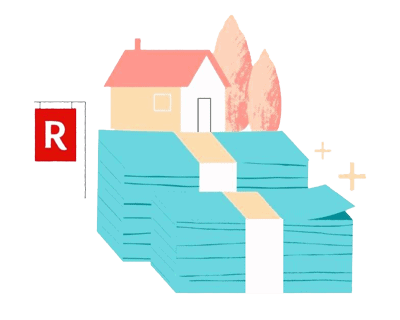The homebuying process can be an exciting time and once you’ve found a home that you can envision yourself in, it’s time to make an offer. This step is crucial—it determines whether you secure the home or lose it to another buyer. There’s a lot to consider when making an offer on a home, such as budget, contingencies, and preparing for possible negotiations.
In this Redfin article, we’ll outline how to make an offer on a house in five steps. Whether you’re buying a home in Minneapolis, MN, or a townhouse in Austin, TX, here’s what you need to know about making an offer on a home to hopefully win the deal.
Key takeaways
- Step 1: Decide on price, down payment, and earnest money
- Step 2: Choose your contingencies
- Step 3: Write up the offer letter
- Step 4: Submit your offer – and wait
- Step 5: Negotiate the terms of the sale

What to do before making an offer
Before making an offer on a home, there are a few things you should do that can help make the process smoother. Let’s explore them.
Get a mortgage pre-approval
A pre-approval letter tells you how much a lender will loan you to buy a home. Most sellers won’t take an offer seriously without pre-approval, so having one in hand will let you move fast when the right home comes along.
Keep in mind that a pre-approval is different from a pre-qualification. A pre-approval is the more serious of the two, as a lender will examine your finances to determine how much they will lend you. A pre-qualification uses information that you provide, but doesn’t include an in-depth look into your finances.
Learn about the local housing market
If homes are selling quickly and above the list price, you’re likely in a competitive market. You could end up competing with other buyers for a home and get drawn into a bidding war. Knowing the market can help you decide which homes to make offers on and what price to offer. Look up housing trends in your area and get insights from your real estate agent.
Your real estate agent may also give you information about why the sellers are selling their home. If the sellers are in a hurry to sell, you may be able to submit a slightly lower offer. However, if the sellers aren’t in a rush, they may be more likely to wait for a higher offer to come in.
Understand the basics of an offer
Your real estate agent will put together your offer using a standard template that includes all the key details:
- Your offer price
- Your down payment amount
- The amount of earnest money you’ll deposit
- A copy of your pre-approval letter
- Any contingencies you want to include
- A breakdown of the closing costs and who will pay each one
- When you hope to close (i.e., complete the purchase)
- The offer’s expiration date
We’ll cover some of these, but your agent should be able to walk you through them all and help you decide how to make an offer that works for you.
5 steps to make an offer on a home
Once you’ve learned what to do before making an offer on a home, you can move on to the steps of making an offer.
Step 1: Decide on price, down payment, and earnest money
If you’ve already been pre-approved, you probably have a good idea how much you can afford to spend on a home. But the price you decide to offer will depend on many factors – the competitiveness of the housing market, the home itself, your budget, and more.
Housing market conditions: If it’s a buyer’s market, meaning more homes for sale than buyers, then you may have the opportunity to offer lower than the home’s listing price. On the other hand, if it’s a seller’s market, meaning fewer homes for sale than buyers, you may need to offer above the listing price to stand out above the competition.
Budget: Your budget may be the most important factor in determining how much to offer on a house. It’s possible you were approved for a larger mortgage, but that doesn’t mean you should buy a home that you’re going to struggle to afford. Consider offering less than your mortgage amount as it will give you room to negotiate if needed.
The home: There are several factors about the home you’re looking to make an offer on that can dictate how much you’re willing to offer.
- Time on the market: The longer the home has been on the market, the more likely the seller is to consider a lower offer.
- Necessary repairs: If the property needs lots of repairs or is turnkey can affect how much you offer.
- Comparable homes in the area: Your real estate agent can pull comparable homes, also called “comps,” which are similar homes for sale or recently sold in the area. This can give you insight as to whether the home is fairly priced.
- Competition: The more competition the home has can highly influence your offer. You may encounter a bidding war, so it is a good idea to discuss this with your agent to determine a plan. Similarly, you and your agent should discuss a plan if the seller has already accepted an offer and you want to submit a backup offer.
There are circumstances where it makes sense to offer an amount above or below the list price and others where you should meet the list price. Your agent can help you determine the right offer for you.
How much should you put down?
0% down – VA or USDA loans
3-5% down – FHA and some conventional loans
10-20%+ down – Helps avoid private mortgage insurance (PMI) and lowers monthly payments.
What is earnest money?
Earnest money is a deposit, usually 1-3% of the home’s sales price, that you pay soon after the seller accepts your offer. It’s a way of showing you’re committed to the deal. Once the sale is complete, the earnest money goes toward your down payment and closing costs.
If you decide not to buy the home for a reason that’s covered in your contract—such as a contingency—you can get your earnest money back. If you decide not to buy the home for another reason, the seller gets to keep your earnest money.

Step 2: Choose your contingency clauses
Contingencies are an important part of your offer because they give you a way to back out of the deal if certain conditions are not met. When you use a contingency to cancel the deal, you can usually recover your earnest money.
The contingencies available to you will depend on your location and the current housing market, but here are the most common ones:
Mortgage contingency: Also known as a financing contingency or loan contingency, this one is essential if you’re getting a mortgage. Your lender will go through the final loan approval process to ensure nothing in your finances has changed before approving your mortgage loan. If your loan isn’t approved, this contingency lets you back out of the deal.
Appraisal contingency: An appraisal measures the home’s value to make sure you and your lender are not paying more than what the home is worth. In most areas, an appraisal contingency lets you back out of the deal if the home’s value is lower than the sales price.
Inspection contingency: A home inspection looks at the condition and safety of the home, plus any repairs that should be made. If the inspection report reveals major issues with the home, you can reconsider your offer. In some cases, you may need additional inspections, such as a pest, sewer, or foundation inspection.
Home sale contingency: If you need to sell your current home before buying the new house, you’ll need to add this contingency as well.
Title contingency: The title is the property’s history of ownership. This gives you the option to walk away if there are any problems with the title, such as judgments or liens against the property or someone else claiming ownership of the home.
Attorney review: You may want an attorney to review the contract before closing on the home. Your attorney can make sure nothing has been removed or added to the contract without your knowledge. This contingency is more common in some states than others.
Sellers prefer offers without contingencies, so use them sparingly if you can. But some can be very important for protecting you as the buyer.
Step 3: Write up the offer letter
The next step is to write the offer letter itself. This is not to be confused with a letter to the seller, which is not a common step anymore as it can violate Fair Housing laws. Your real estate agent will draft up the offer letter for you. However, if you’re working without an agent, here’s what you’ll need to include:
- Address of the home you’re offering to buy
- Your name and anyone else’s name that will be on the house title.
- Your offer price
- Any contingencies you want to include
- Any seller concessions you’re asking for, like repairs or closing costs
- Your mortgage pre-approval letter
- Items you want in the sale, such as appliances
- Earnest money deposit amount
- The date you anticipate the loan closing
- The date you expect to move in
- Deadline for the seller to respond to the offer

Step 4: Submit your offer—and wait
Once your offer is ready, your real estate agent will submit it on your behalf. If the seller has received other offers or expects to, you may have to wait a few days for an answer.
What if I’m caught in a bidding war?
A bidding war happens when a seller receives multiple offers in a short amount of time. Because buyers are competing against each other, they may raise their offer price, give up contingencies, or make other “concessions” to make their offers more appealing.
This can be a tough situation for any buyer, but especially a first-time buyer. You may have to make quick decisions about whether to change your offer or walk away from the home. Your agent can give you advice to help you avoid bidding wars when possible, and navigate them wisely when you can’t.
Step 5: Negotiate the terms of the sale
It’s common to negotiate with the seller and having an experienced real estate agent is crucial. Discuss ahead of time which aspects of the offer you’re willing to negotiate and which are non-negotiable. Here are three scenarios you may face after submitting your offer.
Scenario 1: The seller accepts your offer
If the seller accepts your offer then you’ll move on to the next steps. This means signing the purchase and sale agreement, gathering your earnest money, and applying for a mortgage.
Scenario 2: The seller makes a counteroffer
The second option is that the seller makes a counteroffer. It’s up to you and your real estate agent how you’d like to proceed. The negotiations are typically informal and help you come to an agreement – or walk away from the deal.
Here are some things to consider:
You don’t have to negotiate the purchase price: While it may be that the seller’s counteroffer is a higher purchase price than you offered, that doesn’t mean you have to accept that. You can consider negotiating repair costs or other concessions.
Learn what the seller is looking for: Your real estate agent will reach out to the seller and their agent to determine what the sellers are looking for. Do they want you to remove contingencies? Were they looking for a higher price? This information can help you determine what to negotiate.
Scenario 3: The seller rejects your offer
The final scenario is that the seller rejects your offer. Maybe your offer was too low or there was a cash buyer. If your offer is rejected, then you can move on to looking at other options on the market.

What happens after your offer is accepted?
Whether the seller accepted your offer or you negotiated new terms, there are several steps to take after.
Sign the contract
If you and the seller reach an agreement, you’ll sign a contract. Read it carefully, and make sure you understand the details before you sign. The offer process can be exciting and stressful, but take your time with this step. Ask your agent any questions you have, and find out what will be expected of you in the days and weeks ahead.
Secure your mortgage
Now that your offer is accepted, it’s time to formally apply for your home loan. Your lender will conduct a deeper financial review, finalize your loan terms, and order an appraisal to confirm the home’s value. This stage is crucial—your loan must be fully approved before you can close.
Schedule your inspection, appraisal, and more
Once the contract is signed, you’ll need to arrange key steps to move forward. We always recommend scheduling a home inspection, even if it’s not required, to uncover any potential issues with the property. Your lender will also arrange an appraisal to ensure the home’s value aligns with your loan. If needed, this is also the time to have an attorney review the contract.
Meanwhile, your lender and the title company will be busy checking that everything is in place for closing day. Along with your real estate agent, they should keep you up-to-date on what you need to know and do as the process goes forward. Learn more about closing on a house.
Close on your new home
When all the contingencies are met and your mortgage is ready, you’re finally ready to sign the paperwork and close on the home. Your lender will transfer your funds to the attorney or your title company to finalize your purchase. Once that’s done, you can get your keys.

























